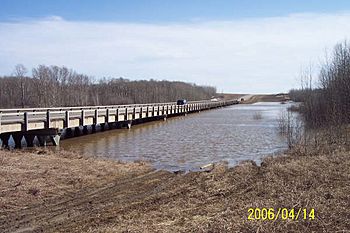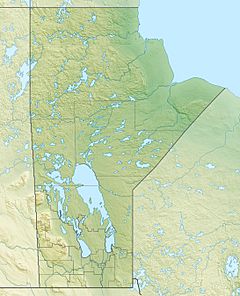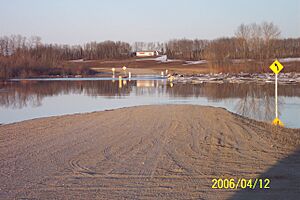Carrot River facts for kids
Quick facts for kids Carrot River |
|
|---|---|

Highway 23 bridge over the Carrot River during the 2006 flood near the town of Carrot River
|
|
|
Location of the mouth of the Carrot River in Manitoba
|
|
| Country | Canada |
| Physical characteristics | |
| Main source | south of Crystal Springs Saskatchewan 52°45′47″N 105°24′18″W / 52.76306°N 105.40500°W |
| River mouth | near The Pas Saskatchewan River, Manitoba 53°50′02″N 101°18′17″W / 53.83389°N 101.30472°W |
The Carrot River is a river in Canada. It flows through north-eastern Saskatchewan and north-western Manitoba. The river starts near the town of Wakaw in Saskatchewan. From there, it flows northeast. It eventually joins the Saskatchewan River near The Pas in Manitoba.
The Carrot River is about 300 kilometers (186 miles) long. It runs alongside the South Saskatchewan River and the Saskatchewan River. Many smaller streams and rivers in north-eastern Saskatchewan flow into the Carrot River. This means it collects a lot of water.
Because it collects so much water, the Carrot River can cause big floods. This often happens during the spring when snow melts. It also floods during heavy rain. Areas around the Town of Carrot River and the Red Earth Indian Reserve are often affected. Floods can make it hard for people to travel.
History of the Carrot River Valley
The Carrot River valley has a long history. It was first home to Cree and Saulteaux Aboriginal people. These groups lived and hunted along the river for many years.
European explorers also visited the area. An English fur trader named Henry Kelsey explored the river in the summer of 1691. Later, in the 1750s, Louis de la Corne, Chevalier de la Corne and Anthony Henday also explored the valley. They were looking for new trade routes and resources.
Amazing Fossils and Ancient Finds
The Carrot River area is famous for its incredible fossils. In the 1980s, a local farmer found many fossils near the river. This led the Royal Saskatchewan Museum to explore the riverbanks.
Scientists found that the fossils were about 92 million years old. This means they came from a time when dinosaurs roamed the Earth. The sites along the Carrot River had many different kinds of fossils. They found ancient sharks and fish, showing that the area was once covered by water.
The most exciting discovery happened in 1991. The Royal Saskatchewan Museum and the Canadian Museum of Nature worked together. They dug up a six-meter-long fossil skeleton. It was an ancient crocodile called a Terminonaris robustus. This specimen was nicknamed "Big Bert."
Big Bert was very well-preserved. It was the only one of its kind ever found in Canada. Scientists also found a complete fossil of a large fish called Xiphactinus. They even found fossils of ancient birds with teeth! These finds help us understand what life was like millions of years ago.
Fish Species in the River
The Carrot River is home to several types of fish. If you were to go fishing there, you might catch:
 | Georgia Louise Harris Brown |
 | Julian Abele |
 | Norma Merrick Sklarek |
 | William Sidney Pittman |



